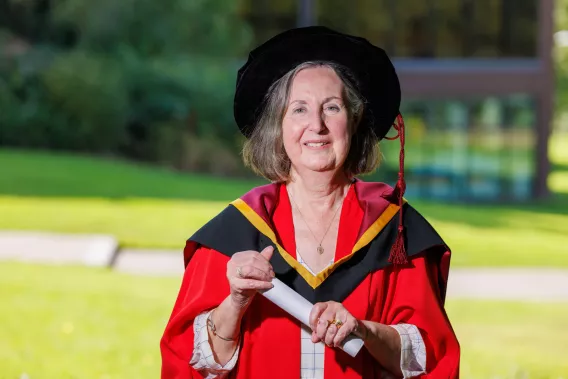
Thursday, 29 August 2024
Life and work have led Barbara Watts down many interesting avenues, but it was her studies at University of Limerick that brought her back to a childhood passion she reluctantly strayed from long ago.
Barbara joined over 3,600 students being conferred this week as part of the University’s August ceremonies, graduating with a PhD from the School of History in UL’s Faculty of Arts, Humanities and Social Sciences.
Originally from Aberdare, Wales but now living in Alberta, Canada, Barbara undertook her PhD entirely remotely, encouraged to continue her studies at UL after completing the MA History of Family, also online.
For Barbara, whose father is originally from Listowel, Co. Kerry, undertaking her PhD – titled Searching for Celtic cousins: Welsh, Irish and Scottish immigrant worker experience in Alberta, Canada, 1880-1920 – combined a love of history with a natural curiosity for her own local and family heritage.
“History was always a passion. But it was as a child that I remember becoming interested in the past,” she explains.
“My mother told stories about people that figured in her life which, of course, were ‘ancient history’ to me then. I loved to hear about people in my family, the war years and my father’s Irish family.
“As a 10-year-old, between trips to the outdoor baths, I took the whole of the summer holidays to research the dates and history of old buildings. In the library, I studied photos of the buildings and the people who lived and worked in them. As a family we took day trips on the train to old churches and museums that my father loved …
“Unfortunately, once I went to grammar school, I could not relate my little bit of Welsh nineteenth century knowledge and my father’s passion for old buildings to the English based history of the curriculum. I dropped history as soon as I could.”
Barbara’s life and career would take many interesting turns. After completing a teacher’s certificate in Dress and Design at Cardiff, she worked in a Welsh comprehensive school as her husband pursued a PhD in Geology. The couple then relocated to Calgary in Alberta, Canada. Keen to re-enter the teaching profession, Barbara undertook a Bachelor of Education in the University of Calgary, meaning she could now teach locally.
“This became the start of a personal educational journey which seems not to have ended,” says Barbara, who further completed a Graduate Diploma in Instructional Development as well as a Master of Education in Teacher Professional Development.
After a fruitful career in which she held roles as diverse as a fine arts consultant and an assistant principal, in 2015 Barbara decided to retire – but that was far from the end of her education journey, and she was eager to ‘continue on her learning curve’.
It was during a holiday back to her native Wales, surrounded by the familiar sights and sounds of her childhood, that Barbara decided the time was right to get back to the history books. After completing an online Local History course at the University of Oxford, and keen to broaden her knowledge, Barbara discovered UL’s MA History of Family Programme. After initial queries with her eventual supervisor, Dr Ciara Breathnach, Barbara knew this was the right choice for her.
“I immediately felt welcome,” recalls Barbara, who reserves special praise for Dr Breathnach – her ‘mentor’ and ‘first port of call’ for support throughout her MA and, later, her PhD.
Once Barbara had the time differences down to an art (“I kept a time conversion chart which I still use”), it was plain sailing; she was paired with another Welsh student on the course for team assignments, and her lectures were recorded and readily available online. Even field trips were recorded – although, Barbara admits, the thoughts of missing out on visits to the National Library of Ireland and Kilmainham Gaol had her wishing she could ‘just take a plane to Limerick’!
In the true spirit of a lifelong learner, Barbara was keen to build on her MA dissertation research into Irish migrants from Newtown, Cardiff. Seeking to delve further into the story, she developed a PhD topic that would explore the history of the migrants who became coal miners in four of Alberta’s coal towns from 1880 to 1920.
“Just as the Newtown community enabled me to add to my knowledge of Wales, studying the coal miners gave me an insight into not only how Alberta began and the difficulties migrants faced entering Canada, but also that Alberta was built on coal – something that history seems to have forgotten.”
Of course, studying remotely – particularly for a period during the Covid-19 pandemic – had its challenges; however, Barbara says, the support from her fellow students as well as academic and administrative staff from the History Department and UL Global Office helped to make her six years of remote study at UL a success. And those people were at the centre of her celebrations on graduation day.
“Apart from attending the ceremony … my most important plan is to meet, in person, people I have come to know over the last six years. I hope, too, to be able to thank those who have helped me along the way,” she says.
Looking forward, Barbara has not closed the book on her research; indeed, she hopes to develop some sections of her thesis into articles and is also looking into presenting her work as a monograph. No matter where the path takes her, one thing is clear: she will no doubt continue to maintain that sense of curiosity in life and learning.
